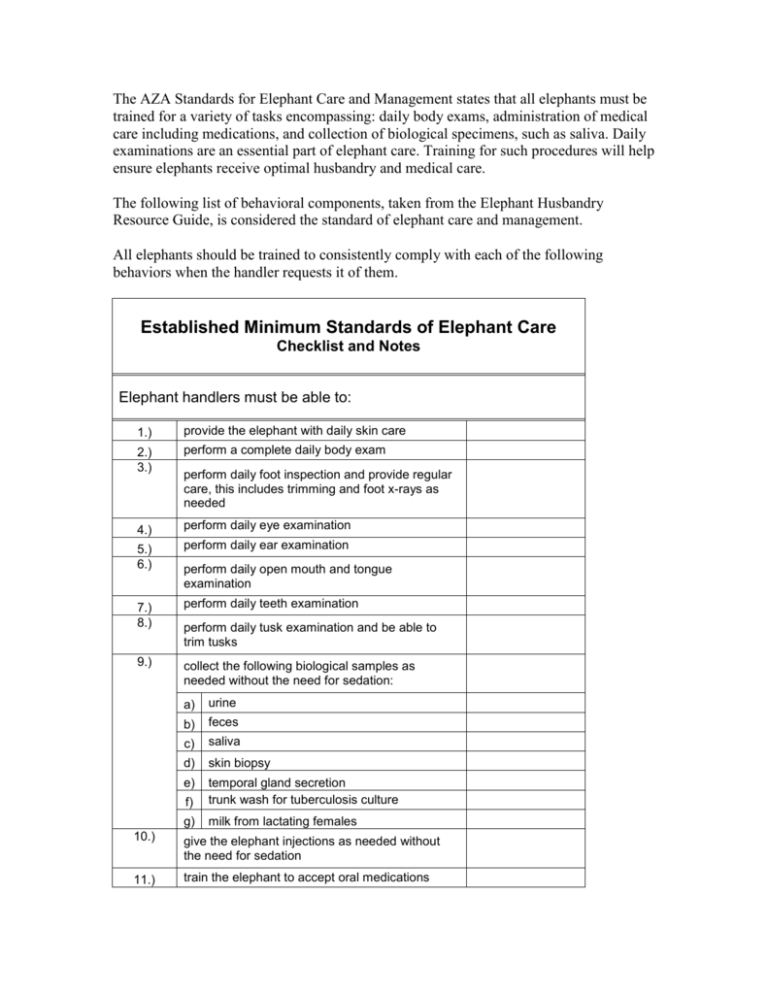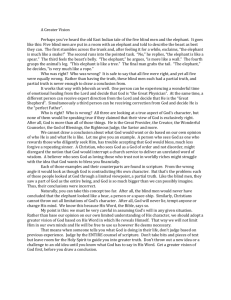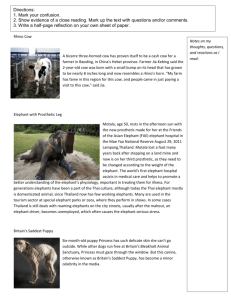Training Behaviors - AZA Elephant TAG/SSP Homepage
advertisement

The AZA Standards for Elephant Care and Management states that all elephants must be trained for a variety of tasks encompassing: daily body exams, administration of medical care including medications, and collection of biological specimens, such as saliva. Daily examinations are an essential part of elephant care. Training for such procedures will help ensure elephants receive optimal husbandry and medical care. The following list of behavioral components, taken from the Elephant Husbandry Resource Guide, is considered the standard of elephant care and management. All elephants should be trained to consistently comply with each of the following behaviors when the handler requests it of them. Established Minimum Standards of Elephant Care Checklist and Notes Elephant handlers must be able to: 1.) provide the elephant with daily skin care 2.) 3.) perform a complete daily body exam 4.) perform daily eye examination 5.) 6.) perform daily ear examination 7.) 8.) perform daily teeth examination 9.) collect the following biological samples as needed without the need for sedation: perform daily foot inspection and provide regular care, this includes trimming and foot x-rays as needed perform daily open mouth and tongue examination perform daily tusk examination and be able to trim tusks a) urine b) feces c) saliva d) skin biopsy e) f) temporal gland secretion trunk wash for tuberculosis culture g) milk from lactating females 10.) give the elephant injections as needed without the need for sedation 11.) train the elephant to accept oral medications 12.) train the elephant to accept ear or leg vein blood collection 13.) 14.) treat wounds train the elephant to enter and stay in the restraint device for: a) husbandry procedures b) veterinary procedures c) reproductive procedures 15.) demonstrate a method of restraint if no restraint device is present for: a) husbandry procedures b) veterinary procedures c) reproductive procedures 16.) weigh the elephant 17.) 18.) train the elephant to accept an enema 19.) train the elephant to accept transabdominal ultrasounds 20.) train the female elephant to accept a urogenital examination 21.) train the male elephant to accept semen collection 22.) train the elephant to accept radiographs and thermographs 23.) load and ship an elephant for translocation train the elephant to accept transrectal ultrasound examination Elephant handlers should be able to address elephant social issues by: 1.) managing social compatibility 2.) 3.) managing dominance and aggression managing introductions with conspecifics: a) new female to herd b) females to males for breeding c) new calf born to its mother d) new calf and mother to herd 4.) being able to separate animals for periods of time Elephant handlers must be able to address psychological and physiological welfare by providing: 1.) sufficient mental stimulation, and behavioral enrichment to promote activity and proper social behavior 2.) 3.) sufficient physical exercise to produce muscle tone, flexibility, agility, and stamina and promote a healthy weight providing tactile contact with other elephants







